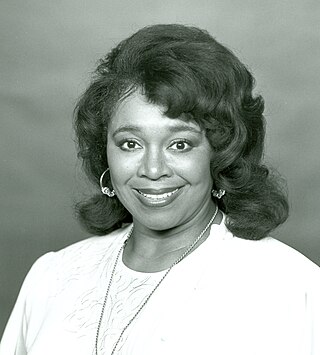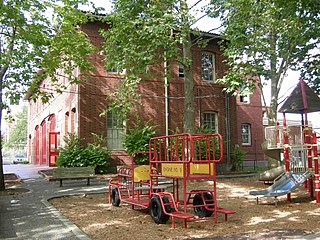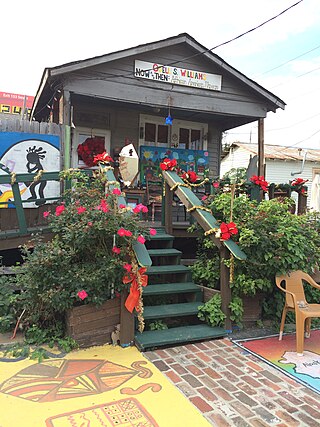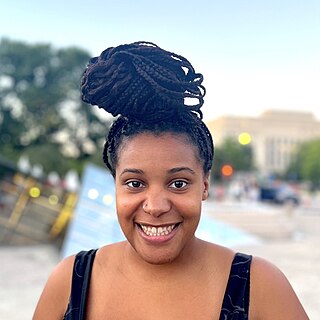
Juneteenth, officially Juneteenth National Independence Day, is a federal holiday in the United States. It is celebrated annually on June 19 to commemorate the ending of slavery in the United States. The holiday's name is a portmanteau of the words "June" and "nineteenth", as it was on June 19, 1865, when Major General Gordon Granger ordered the final enforcement of the Emancipation Proclamation in Texas at the end of the American Civil War.

Montlake is a wealthy residential neighborhood in central Seattle, Washington. It is located along the Montlake Cut of the Lake Washington Ship Canal, bounded to the north by Portage Bay, to the east by the Washington Park Arboretum, and to the south and west by Interlaken Park. Capitol Hill is on its south and west sides, and the University of Washington campus lies across the Montlake Cut to the north. State Route 520 runs through the northern tip of Montlake, isolating four blocks from the rest of the neighborhood. The (unofficial) City Clerk's map of Montlake considers it to extend further west, past Interlaken Park, extending to Broadway Avenue E. and, between Lynn Street and State Route 520, all the way to Interstate 5.

Capitol Hill is a densely populated residential district in Seattle, Washington, United States. One of the city's most popular nightlife and entertainment districts, it is home to a historic gay village and vibrant counterculture community.

Barbara-Rose Collins was an American politician from the U.S. state of Michigan and the first black woman from Michigan to be elected to Congress.

The Central Area, commonly called the Central District or The CD, is a mostly residential district in Seattle located east of downtown and First Hill ; west of Madrona, Leschi and Mt. Baker; south of Capitol Hill, and north of Rainier Valley. Historically, the Central District has been one of Seattle's most racially and ethnically diverse neighborhoods, and was once the center of Seattle's black community and a major hub of African-American businesses.

Selena Etc. was a South Texas-based boutique and beauty salon, which was founded and owned by the late American singer, Selena. Selena Etc. finished its building on January 27, 1994, in Corpus Christi, Texas, which was the headquarters.

Kshama Sawant is an Indian-American politician and economist who served on the Seattle City Council from 2014 to 2024. She is a member of Socialist Alternative, the first and only member of the party to date to be elected to public office.

Ella Etna McBride was an American fine-art photographer, mountain climber, and centenarian known for her career achievements after age sixty. In addition to running her own photography studio for over thirty years, she also spent eight years running the photography studio of Edward S. Curtis.

The Odell S. Williams Now And Then African-American History Museum or the Baton Rouge African-American Museum, is a non-profit museum of African-American history and heritage located in Baton Rouge, Louisiana, United States. The museum is named for Odell S. Williams, an educator in Baton Rouge, Louisiana. Founded by Sadie Roberts-Joseph in 2001, the museum remains the only museum dedicated to African and African American history in the city. The museum celebrates Juneteenth, Black History Month, and American history year round.

The history of African Americans in Austin dates back to 1839, when the first African American, Mahala Murchison, arrived. By the 1860s, several communities were established by freedmen that later became incorporated into the city proper. The relative share of Austin's African-American population has steadily declined since its peak in the late 20th century.

Luly Yang is a Taiwanese-American fashion designer. She is also a creative artist and an internationally recognized fashion designer. Yang has her own couture fashion in Seattle and her designs have earned her plenty of local and international business and recognition. Luly Yang Couture is a fashion house, founded in 2000, that conceived itself as being the finest provider of bridal gowns, evening wear, and suiting. After completing the uniform design for all Alaska Airlines employees in 2018, Yang launched Luly Yang Design Group, specializing in ready to wear and uniform design.

"Black Parade" is a song by American singer and songwriter Beyoncé. It was produced by Beyoncé and Derek Dixie in the wake of the murder of George Floyd and the protests that followed it. The song was surprise released on June 19, 2020, also referred to as Juneteenth, a day commemorating the abolishment of slavery in the United States. The song serves as a celebration of Black culture and the support of Black activism. While initially a stand-alone single, an extended version of the song was used in the end credits of Beyoncé's film Black Is King and included in the accompanying deluxe edition of The Lion King: The Gift, both released on July 31, 2020.
Channing Godfrey Peoples is an American writer, director, and producer. Her feature film directorial debut Miss Juneteenth received critical acclaim.
Omari Salisbury is an American journalist, videographer, and business man from Seattle, Washington who founded Converge Media, a local independent production company for local news and entertainment, in 2017. Salisbury was reporting live for Converge to cover Seattle's protest response to the murder of George Floyd, when he captured the "pink umbrella video" that was described as an early flashpoint of the 2020 protests in Seattle.

Opal Lee is an American retired teacher, counselor, and activist in the movement to make Juneteenth a federally-recognized holiday. She is often described as the "grandmother of Juneteenth".

Ingersoll Gender Center is an American non-profit organization based in Seattle that provides peer-led support groups, advocacy and community organization for transgender and gender non-conforming people in the Puget Sound region. It is one of the oldest organizations serving said community in the United States.

A "Black Lives Matter" street mural was painted in Capitol Hill, Seattle, in the U.S. state of Washington in June 2020. Maintained by the Seattle Department of Transportation, the artwork has survived longer than many Black Lives Matter street murals across the United States.

CC Attle's is a gay bar in Seattle's Capitol Hill neighborhood, in the U.S. state of Washington.
Draze is a Zimbabwean-American hip hop artist, songwriter, producer and social justice activist. He is known for blending traditional African sounds, marimba, and mbira with hip hop music. He won an Emmy Award in 2022.

Nia Keturah Calhoun is a DC-based multidisciplinary artist who is best known for her mural on 14th Street of Supreme Court Justice Ketanji Brown Jackson. Her work was exhibited by Smithsonian Asian Pacific American Center, 2017 Women's March, and the National Cherry Blossom Festival. The Human Rights Campaign had also partnered with her in 2022.